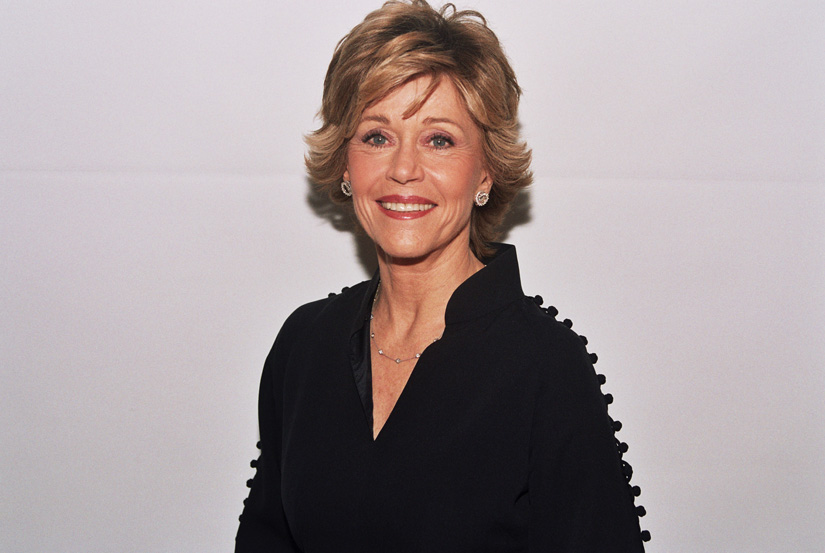
- Industry
The Indomitable Jane Fonda
With a glowing resume that frames an edgy career spanning 55 years and dozens of awards, you’d think Jane Fonda has nothing more to prove, but she is having yet another glorious moment in the spotlight. Jane Fonda is having a shining moment – another one. When your career spans 55 years and dozens of awards, including seven Golden Globes, shining moments tend to be a constant, rather than the exception. Right now she’s being binge-watched on Netflix’s series Grace and Frankie, playing the straight-laced Grace to Lilly Tomlin’s free-spirited Frankie as two mature women reinventing their lives; and she was the toast of the Croisette as part of the stellar ensemble cast of Paolo Sorrentino’s Youth, in competition in Cannes. But wait, there’s more! Later this year and/or early next year she will be seen on the big screen in the dark comedy Krystal, directed by William H. Macy and co-starring Josh Hutcherson, Sienna Miller, Felicity Huffman and John Hawkes; and in director Gabriele Muccino’s family drama Fathers and Daughters, alongside Amanda Seyfried, Aaron Paul, Octavia Spencer and Diane Kruger. “It’s harder to make mistakes when you’re older”, she told us on the set of Grace and Frankie, late last year. “My whole life, I did nothing but take leaps of faith and sometimes missed and sometimes landed on my feet. And mostly good things happened because I took leaps of faith.” Indeed: from her political activism to her role as leader of the fitness revolution; with roles as diverse as Barbarella in her then-husband’s Roger Vadim’s eponymous space pop opera, in 1968, the iconic Bree from Alan Pakula’s Klute, in 1971, and playwright Lillian Hellman (in Fred Zinneman’s Julia, 1977); from the quiet meditation of On Golden Pond – the only picture she shared with her father, Peter Fonda – to the feminist riot of Nine to Five, alongside Lilly Tomlin and Dolly Parton, her extraordinary trajectory is nothing but a series of leaps of faith. “I wish that I could say with all my heart and belief that a film could liberate somebody”, Jane Fonda told us in December of 1980, when Nine to Five, was being released and she had just finished shooting On Golden Pond. “At best I think films play a role in encouraging … it can raise consciousness.” A year before Nine to Five Fonda had raised the issue of the unproven safety record of nuclear facilities with The China Syndrome, produced (and co-starred) by Michael Douglas, directed by James Bridges and with Jack Lemmon rounding up the top cast. The picture provoked a storm of controversy and proved to be eerily prescient. “An accident can happen”, she told us at the time. “What are we doing placing public welfare in the hands of corporate executives who really only care about maximizing their profit?” Six years later, starring in Norman Jewison’s adaptation of John Pielmeier’s play Agnes of God, about the intense interactions between a court-appointed psychiatrist (Fonda) and a novice nun (Meg Tilly) accused of murder, Jane shared her spiritual convictions with us: “I do believe in miracles and I do believe there is a higher power and that certain things happen to us in life that are sometimes very improbable are meant to help us see that there is a being more powerful that we are.” Her activism was, she admitted, “less impatient” than in the days when she believed that “profound historical, societal changes can happen quickly.” Always the searcher, Fonda was more focused on “re-examining and question certain things” in her own life, like noticing “alcoholism around me” and going “to AA meetings four times
a week”. In the 1990s she took a gigantic leap of faith, announcing her retirement from screen and stage. It didn’t last that long, though – in May 2005 she was back on screens with Monster in Law, alongside Jennifer Lopez, and, four years later, she took the stage by storm in Moisés Kaufman’s 33 Variations, which earned her a Tony nomination. She never stopped. “I realized that I’m a different person than I was 15 years ago”, she told us. “And I was curious to see whether the process of making a movie would bring me some joy.” Plus, she said, she needed money. Not for herself – for the work she does in Georgia, where she lives, in support of young and poor families. “I’m not going to be around much longer. I want to make sure that the work that I do is endowed. That means that when I die there’ll be enough money to continue funding my work.” There is, however, one leap she’s yet to take: “I have the most tremendous hidden desire to stand on a stage and sing”, Jane told us back in 1980. “And thank your lucky stars it will stay hidden.” But who knows? With Jane Fonda, it’s never too late. Ana Maria Bahiana